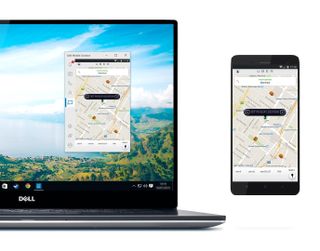Dell’s Mobile Connect Could Be Competition To ‘Always On’ Technology, In A Way

LAS VEGAS, NV -- Dell revealed that all of its new consumer-grade PCs would now include a new software tool designed to give your PC the connectivity and application resources of your mobile phone.
The PC/Smartphone Connection
Dell Mobile Connect is a utility that gives you complete access to your mobile phone through your PC via advanced Bluetooth and Wi-Fi Direct wireless technologies. The secure point-to-point connection never transfers data over the internet or Wi-Fi routers, and your data is accessible only on the paired PC, when you're in range.
The new software was designed to increase productivity by eliminating the need to split your attention between your PC and smartphone, allowing you to receive all of your phone calls, SMS and IM messages, and other app notifications at your PC while working or gaming. You get to choose which notifications you receive, and you can respond and interact directly from the PC (answer calls, reply to messages, use apps) without touching your phone.
How It Works
Dell Mobile Connect is factory installed at no additional cost in the company’s XPS, Alienware, Inspiron, and Vostro lineups, and it's paired to your phone via a free app that is compatible with Android and iOS devices. Dell doesn’t ensure app compatibility with all smartphones, stressing that the device must be running at least Android 5.0 or iOS 10 to work with Mobile Connect.
Once you pair your phone to your Dell PC, you can customize which app notifications will appear in your Windows-based OS. Calls, text messages, and even apps such as Whatsapp, Facebook, Instagram, Uber, Venmo and others are all accessible from the Dell Mobile Connect software, giving you the ability to focus on a singular device (your PC) while retaining the use of your smartphone’s functionality.
Why Does This Sound Familiar?
If the concept of Dell Mobile Connect sounds familiar, it’s because the idea of harmonious functionality between a smartphone and larger computing devices is not a new thing. Qualcomm and Intel have their own version of similar “Always On” devices that leverage LTE connectivity in a mobile computing device, and HP and Razer took a different approach to the issue with their respective smartphone/dummy laptop combinations--the HP Elite x3 with the Mobile Extender, and the Razer Phone paired with the recently unveiled Project Linda. At this point, you could consider the PC/Smartphone connection to be a growing trend in the industry, but Dell’s simple point-to-point Mobile Connect software seems to a simple and clever alternative to hardware-based solutions.
Although these are inherently different deployments, and the Windows-based Qualcomm devices and Intel’s investment in eSIM and LTE technologies are centered around connectivity and security and battery life, Dell’s Mobile Connect seems to solve many of the same problems--but without the emphasis on power saving and security, or the need to buy a new, expensive device.
Stay on the Cutting Edge
Join the experts who read Tom's Hardware for the inside track on enthusiast PC tech news — and have for over 25 years. We'll send breaking news and in-depth reviews of CPUs, GPUs, AI, maker hardware and more straight to your inbox.
A Better Mouse Trap?
Dell’s Mobile Connect was designed to connect your PC and smartphone for a similar end result (your phone is already “always on”), but without impacting how you use your devices. The phone is still a phone, and the PC is still a PC, each with their own respective functionality and operating systems intact. The connection simply allows you to access your phone from your PC, giving you the notifications and app accessibility you’d have if you were holding it in your hand.
The accessibility to phone-specific apps goes beyond what Windows-based Qualcomm and Intel solutions can do in that respect, and the ability to pick which apps, notifications, and services will appear on your PC gives Dell Mobile Connect significant user customization and access, which is useful in both enterprise (which “Always On” devices seem to be targeting) and consumer environments.
Many companies seem to be examining ways to bring smartphone functionality to larger computing devices, but Dell Mobile Connect makes a case for both average consumers and enterprise customers to make the PC/smartphone connection with its simplicity and functionality.
Most Popular


